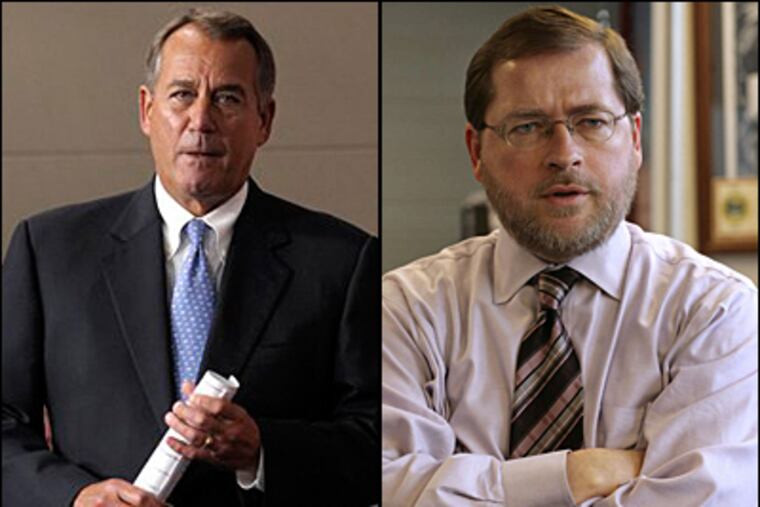Thomas Fitzgerald: Signals mixed on Norquist's grip
Some no longer sticking by no-tax-hike pledge, but he isn't sounding a softer line. Polls are divided.

For a generation, it has been Republican orthodoxy: No tax hikes. Period.
And, if they knew what was good for them, GOP candidates for Congress, governor, or president, would as a matter of course publicly sign conservative lobbyist Grover Norquist's pledge to eschew any tax increase, even by closing loopholes or tweaking the code.
Norquist, the enforcer of the true faith, stores the signed pledges in a vault in the Washington offices of his advocacy group, Americans for Tax Reform, and he has often threatened primary challenges for those who break their word.
The spell has worked for a long time. But now, Norquist's hold on the party may be loosening.
After President Obama's decisive Electoral College win and polls that appear to show public support for increased revenue, congressional Republicans facing the federal government's monumental fiscal mess are tiptoeing away from the pledge. Some are openly defying Norquist.
The federal deficit stands at $1 trillion, the national debt at $16 trillion, and the cost of the popular social safety net, particularly Medicare and Social Security, continues to grow. More immediately, unless the two parties can agree on a fiscal plan before Jan. 1, hundreds of billions of dollars of automatic tax increases and spending cuts will go into effect.
House Speaker John A. Boehner (R., Ohio), who has signaled a willingness to support revenue increases, has dismissed Norquist as "some random person." The activist's power has been "broken," says Sen. John McCain (R., Ariz.). "Grover Norquist has no credibility, so I don't respond to him," Sen. Saxby Chambliss, Republican of Georgia, said earlier this year.
And former President George H.W. Bush, who came to grief when he violated his "no new taxes" campaign promise, was equally scathing. "Circumstances change, and you can't be wedded to some formula by Grover Norquist," he said. "It's - who the hell is Grover Norquist, anyway?"
Norquist denies any threat to his power or to the antitax cause.
"The R's are holding," he said last week at the Center for the National Interest. "The fantasy is that the Republicans would cave on marginal tax rates," he said. "They're nonnegotiable."
Before this month's election, Norquist counted 238 members of the House of Representatives as signers of his pledge, a majority of the total of 435. But no more than 212 members of next year's House are considered solid on the no-tax pledge. Some pledge signers lost, and others say they no longer consider it binding because of its rigidity.
"Basically the pledge is like a Master Lock," freshman Republican Rep. Scott Rigell of Virginia said earlier in the year when he told his constituents he was jettisoning the promise. They reelected him anyway.
Obama is insisting that tax rates be allowed to increase on the wealthiest taxpayers, with lower rates continuing for those making under $250,000 a year, as part of a budget deal. Many GOP leaders, wary of the potential economic harm of failure, say it may be worthwhile to cut a deal with the president to avoid a broader tax increase and win some reductions in entitlement programs.
In the presidential exit polls, a 47 percent plurality agreed with Obama that tax rates should be hiked only on incomes greater than $250,000; 13 percent said higher taxes should apply to everyone. Only 35 percent said taxes should not be increased at all. Moreover, a new Pew Research Center poll says that if a fiscal-cliff deal fails, 53 percent of Americans will put primary blame on Republicans.
But, "Republicans who raise taxes do their own brand a great deal of damage," Norquist told the Los Angeles Times. He may be right. After all, the GOP has had a success with its low-tax, smaller-government emphasis, beginning with Ronald Reagan.
The exit polls also reflected support for that traditional GOP approach. For instance, 51 percent of the electorate said it believes government is doing too much, while 43 percent say it should do more. And, by 49 percent to 44 percent, voters thought that the Affordable Care Act (Obamacare) should be repealed.
In other words, analysts say, the country remains divided on the big questions, and it may be early to count out Norquist. That divide will likely continue.
Political polarization has caused "a collapse in consensus, in common frames of reference," said Bill Galston, a scholar at the Brookings Institution and a former adviser to President Bill Clinton.
"Fifty years ago, we had two Keynesian political parties - one openhanded and one cheap," said Galston, speaking at a recent conference at the University of Pennsylvania. "Now we have one political party that wants to defend the entitlement state, and the other, which wants to dismantle it."
at 215-854-2718 or tfitzgerald@phillynews.com, or
follow @tomfitzgerald on Twitter. Read his blog, "The Big Tent,"